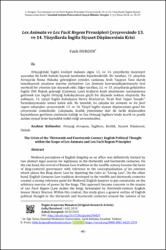| dc.contributor.author | Durgun, Fatih | |
| dc.date.accessioned | 2018-12-11T07:53:59Z | |
| dc.date.available | 2018-12-11T07:53:59Z | |
| dc.date.issued | 2018-05-25 | |
| dc.identifier.issn | 2148-4287 | |
| dc.identifier.issn | 2148-7189 | |
| dc.identifier.uri | https://hdl.handle.net/11363/448 | |
| dc.description | DOI: 10.17336/igusbd.394029 | en_US |
| dc.description.abstract | Ortaçağ’daki İngiliz kraliyet makamı algısı 13. ve 14. yüzyıllarda meşruiyet açısından iki farklı hukuki kaynak tarafından biçimlendirildi. Bir taraftan, 12. Yüzyılda Avrupa’da Roma Hukuku geleneğinin yeniden canlanışı, kralı Yaşayan Yasa olarak tanımlayarak yasaların üzerine yerleştiren Lex Animata kavramsallaştırmasıyla kral merkezli bir yönetim için dayanak oldu. Diğer taraftan, 12. ve 13. yüzyıllarda geliştirilen İngiliz Örfi Hukuk geleneği (Common Law) kralların keyfi yönetimine sınırlandırma getirmek için İngiliz Ortaçağ hukukçularına güçlü bir dayanak noktası oluşturdu. Bu yaklaşım, 13. yüzyıl İngiliz hukukçusu Henry Bracton’un “Kralı Kral Yapan Yasadır” formülasyonunda somut halini aldı. Bu temelde, bu çalışma lex animata ve lex facit regem anlayışları çerçevesinde 13. ve 14. Yüzyıl İngiliz siyaset düşüncesinin genel bir çerçevesini çizmektedir. Çalışmada, krallık yönetimine dair iki farklı düşünceden kaynaklanan gerilimin çözümsüz kaldığı ve Geç Ortaçağ İngiltere’sinde teorik ve pratik açıdan siyasal krize kaynaklık teşkil ettiği savunulacaktır. | en_US |
| dc.description.abstract | Medieval perception of English kingship as an office was definitively formed by two distinct legal sources for legitimacy in the thirteenth and fourteenth centuries. On the one hand, the revival of Roman Law tradition in the twelfth century became the basis of king-centered governance with reference to the conceptualisation of lex animata which places the King above Law by depicting the ruler as “Living Law”. On the other hand, English Common Law tradition developed in the twelfth and thirteenth centuries created a strong reference point for Medieval English lawyers to put constraints on the arbitrary exercise of power by the kings. This approach became concrete in the maxim of Lex Facit Regem (Law makes the king) formulated by thirteenth-century English lawyer Henry Bracton. Within this context, this study gives a general outline of English political thought in the thirteenth and fourteenth centuries around the notions of lex animata and lex facit regem. It argues that the tensions caused by two distinct notions about kingly governance remained unsolved and continued to become the source of theoretical and practical political crises in Late Medieval England. | en_US |
| dc.language.iso | tur | en_US |
| dc.publisher | İstanbul Gelişim Üniversitesi Yayınları / Istanbul Gelisim University Press | en_US |
| dc.rights | info:eu-repo/semantics/openAccess | en_US |
| dc.subject | Research Subject Categories::SOCIAL SCIENCES | en_US |
| dc.title | Lex Animata ve Lex Facit Regem Prensipleri Çerçevesinde 13. ve 14. Yüzyıllarda İngiliz Siyaset Düşüncesinin Krizi | en_US |
| dc.title.alternative | The Crisis of the Thirteenth and Fourteenth-Century English Political Thought within the Scope of Lex Animata and Lex Facit Regem Principles | en_US |
| dc.type | article | en_US |
| dc.relation.publicationcategory | Makale - Ulusal Hakemli Dergi - Kurum Yayını | en_US |

















